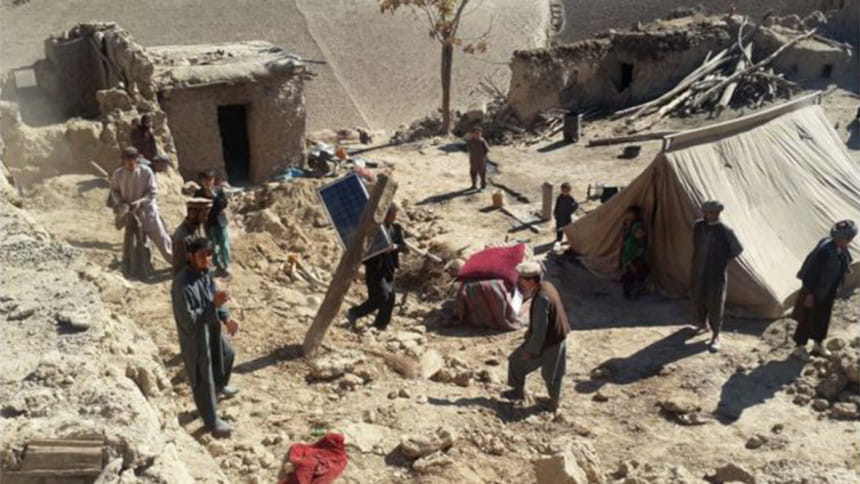Afghanistan-Pakistan quake: Taliban seize Darqad district

The Taliban have seized Afghanistan's Darqad district, one of those hit by Monday's earthquake that killed at least 360 in Afghanistan and Pakistan.
A police spokesman in Takhar province, which includes Darqad, confirmed it had fallen and said heavy fighting was continuing in two other districts.
Although the Taliban has said its fighters have been ordered to help victims, there are worries insecurity is hampering the relief effort.
The quake left at least 2,000 injured.
There has not been much damage or loss of life in Darqad itself after the magnitude-7.5 earthquake but many other areas near it have been destroyed, the BBC's Shaimaa Khalil reports from Kabul.
There are worries the latest fighting will have an even more detrimental effect on any aid getting to the remote province, she adds.
Earlier on Wednesday, the Afghan authorities told the BBC that aid had started to trickle through to neighbouring Badakhshan province - the epicentre of the earthquake.
The Afghan minister for disaster management said that tents and blankets had been distributed in some communities but there were still many others which had not yet been reached.
He added that most roads in the eastern province of Nuristan had been blocked by landslides. One plan the Afghan authorities were considering, he said, was to reach affected area via neighbouring Tajikistan.
Aid workers have warned that some Afghans and Pakistanis made homeless by Monday's earthquake could die from exposure.
There is an urgent need for tents and blankets for those forced to spend a second night outdoors, they said.
Children are especially at risk of succumbing to the extreme cold.
Thousands spent Tuesday night in near-freezing temperatures, reluctant to go back inside for fear of aftershocks, Pakistani media reported.
On Tuesday, the Afghan presidential palace tweeted that the death toll had risen to 115, with 538 people injured. It said that 7,630 homes, 12 schools and 17 mosques were among the buildings destroyed or damaged.
In a televised address, President Ashraf Ghani urged those living in affected areas to help the rescue effort.
The governor of Badakhshan province, Shah Waliullah Adeeb, said survey teams were heading into more remote areas on Tuesday but landslides had blocked roads and helicopters were needed.
Afghan victims included 12 schoolgirls killed in a crush as they tried to leave their classes in Taluqan, Takhar province.
In Pakistan, at least 248 people were killed and 1,665 injured, the national disaster agency said.
In Khyber Pakhtunkhwa province alone, authorities said at least 202 people had died, and more than 1,480 were injured. At least another 30 died in the north-western tribal areas.
The US Geological Survey (USGS) reported that the earthquake was centred in the mountainous Hindu Kush region, 76km (45 miles) south of Faizabad, in Badakhshan province.
It was deep - more than 200km below the surface - which meant the shaking at ground level was less than for a shallow earthquake.
The USGS said a series of aftershocks - all measuring 4.0 or higher - had struck west of the original quake.
Afghan quake: The corner of a continental collision
Residents of Kabul and the Indian capital Delhi were shaken by the earthquake and buildings in the Tajik capital Dushanbe were also damaged.
The region has a history of powerful earthquakes caused by the northward collision of India with Eurasia. The two plates are moving towards each other at a rate of 4-5cm per year.
In 2005, a magnitude-7.6 quake in Pakistan-administered Kashmir left more than 75,000 people dead.
In April this year, Nepal suffered its worst earthquake on record, with 9,000 people killed and about 900,000 homes damaged or destroyed.

 For all latest news, follow The Daily Star's Google News channel.
For all latest news, follow The Daily Star's Google News channel. 



Comments